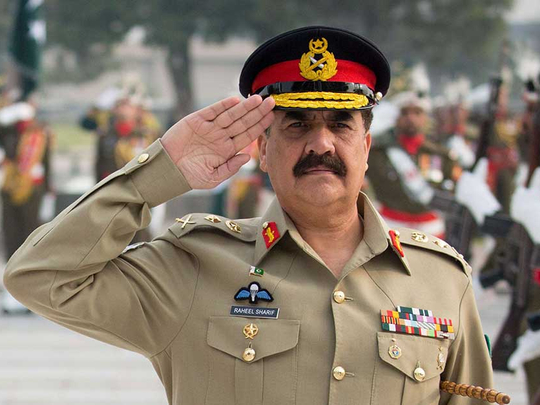
The New Year’s Day promise by Pakistan’s army chief, General Raheel Sharif, carried an upside potential but also a downside risk. Speaking to prominent tribal figures from the south-western Balochistan province at a public event, Gen Sharif promised to oversee an end to terrorism this year, setting in motion a target that he seems determined to achieve. Yet, the downside risk emerges from the multi-faceted challenges faced by Pakistan owing entirely to the way the country is being governed.
In the past year, the Pakistan army has clearly and forcefully pushed back militants from a number of trouble spots. These range from the rugged terrain of the northern tribal areas along the Afghan border to the populous city of Karachi. Today, the receding terrorism challenge is clearly evident in a number of areas.
In the tribal region, many of the locals who were forced out as internal refugees within their own country appear confident enough to have returned home to resume normal lives. Meanwhile in Karachi, a cosmopolitan city of 20 million, the main shopping centres are open later than before in a sign of returning normality, while motorists are also out later than earlier in a sign of growing self-confidence.
The irony surrounding Gen Sharif’s message however was not lost on those who almost simultaneously watched Prime Minister Nawaz Sharif, who is not related to Sharif, speak in Islamabad on New Year’s Day. The occasion, surrounded by impressive fanfare, was used by the prime minister to announce a new scheme to curb tax evasion in Pakistan, seeking voluntary compliance. Once again, the event clearly emphasised a well-known reality — Pakistan’s ruling structure simply doesn’t have the stomach to go for the hard stuff.
In a country with rampant tax evasion and where less than one per cent of the population pays an income tax, Sharif, himself a businessman cum industrialist, appears reluctant to take his fellow community members to task.
The new package of incentives may give a break once again to those who rampantly abuse the taxation system. But it will just not do anything to begin tackling the many difficult challenges faced by Pakistanis on a daily basis. The contrast between what Pakistan needs to do as opposed to what it has done so far in curbing the menacing consequences of terrorism, was pointed out by Gen Sharif when a statement issued in his name in November following a meeting of his top military commanders, sought initiatives in areas related to governance to sustain the gains by the army in the past year. Between the messages from Pakistan’s two leaders lies a set of glaring contrasts, each with the potential to continue disrupting prospects for the future. Notwithstanding the latest space given to tax evaders by the prime minister, there is no end in sight to widespread abusive practices in this area by his own community of businessmen.
Power shortages
Indeed, to make matters worse, just recently the deadline for paying income tax has thrice been extended since September, in an unprecedented setback to an already badly tainted structure.
While Finance Minister Ishaq Dar, who by virtue of his son being married to the prime minister’s daughter considers himself a member of the ruling family, often claims kudos for stabilising the economy, he remains far from some key realities. The winter this year has once again arrived with widespread gas shortages across Pakistan, forcing the poorest of the poor to rely on more expensive alternative fuels just to cook food.
Meanwhile, the legacy of widespread electricity shortages continues to haunt Pakistan for almost seven years. Dar’s claim to fame lies in stabilising Pakistan’s liquid foreign currency reserves and also the rupee. Yet those variables have failed to end the misery of Pakistan’s most impoverished households.
In large part, the challenge of the individual household remains unresolved because few in the ruling structure have begun to recognise them. For the prime minister and his team, notably including Dar, pursuing large-scale mega-projects such as road networks, high profile bus and train projects, remains the sought-after dream. The hope is that with these fanciful initiatives will come economic prosperity and stability to Pakistan.Yet, this view fails to recognise a very dark side of Pakistan’s future. On the one hand, without a concerted push to tackle the highly dilapidated state-provided health care and education, a widely needed push for improving the lives of a large majority of Pakistanis will indeed remain an elusive goal.
This is indeed the gap which could easily disrupt the gains made by the military in the past year. Without a massive push to tackle the challenges surrounding Pakistan’s most impoverished segments, the country’s newly found stability of today is indeed in danger of being frittered away.
On the other hand, the prime minister and his ruling structure are also in danger of picking an ill-advised fight with the army, as they have done in the past.
Although the exact sequence of coming events in Pakistan is hard to predict, the prime minister is known to have picked his own fights with the army which in 1999 triggered the last military coup. That followed a previous encounter in 1998, which forced out the widely respected General Jehangir Karamat, army chief at the time.
On the wider political front, Pakistan’s politicians also need to rally behind Gen Sharif as he keeps up the push. But recent events are hardly encouraging. In a widely noticed event just in the past few weeks, the provincial government of the southern Sindh province, of which Karachi is the local capital, led by the opposition Pakistan People’s Party or PPP, dragged its feet on extending the tenure of army run units which in the past year have stabilised Karachi. Though the PPP relented in the end, the event badly exposed the inability of Pakistan’s political class to see the writing on the wall.
Farhan Bokhari is a Pakistan-based commentator who writes on political and economic matters.








